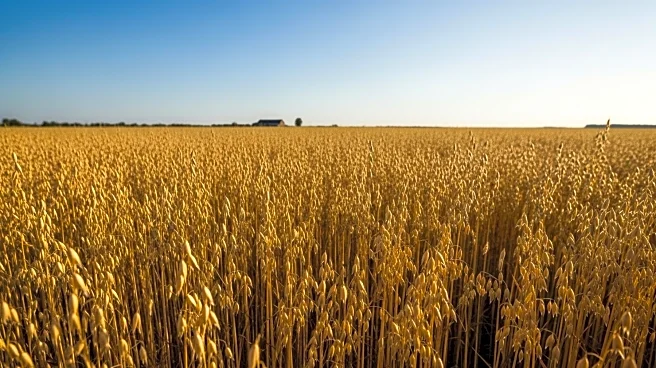What's Happening?
Midwest oat growers are advocating for a resurgence in oat production, highlighting the economic and environmental benefits of growing oats domestically. Despite the potential advantages, large agricultural companies and commodity groups have not shown significant support for oats, as they do not require hybrid seeds, crop insurance, or extensive fertilizer. This lack of backing has left oat growers to promote their own cause. Iowa and Minnesota farmers have conducted field trials demonstrating that food-grade oats can be grown locally, which could save freight costs and improve soil health. However, the absence of financial incentives from major agricultural players remains a challenge.
Why It's Important?
The push for increased oat production in the Midwest is significant due to its potential impact on local economies and environmental health. Growing oats domestically could reduce reliance on Canadian imports, lower transportation costs, and mitigate tariff risks. Additionally, oats contribute to improved soil health and water quality, offering a sustainable alternative to the corn and soybean rotation that dominates Midwest agriculture. This shift could benefit farmers seeking diversification and consumers interested in sustainable products. However, without support from major agricultural companies, the expansion of oat production faces hurdles.
What's Next?
Oat growers are continuing their efforts to promote the benefits of domestic oat production. Farmers have banded together to invest in a new oat-processing plant in Minnesota, which is expected to open next year. This facility aims to process millions of bushels of oats annually, providing a premium market for local growers. The success of this initiative could encourage more farmers to consider oats as a viable crop, potentially influencing agricultural practices and research priorities in the region. The response from major companies like Quaker, which has yet to comment on recent domestic oat shipments, will be crucial in determining the future of Midwest oat production.
Beyond the Headlines
The movement towards increased oat production in the Midwest reflects broader trends in consumer preferences for sustainable and allergen-free products. As demand for oat-based products like oat milk and gluten-free flour grows, the agricultural landscape may shift to accommodate these preferences. This change could lead to long-term improvements in soil health and water quality, addressing environmental concerns associated with traditional farming practices. The collaboration between farmers and new processing facilities highlights the potential for grassroots initiatives to drive change in the agricultural industry.










